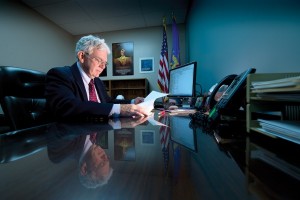Access to Justice Commission makes its case for state money
By: Eric Heisig//April 4, 2014//

Access to Justice Commission President Gregg Moore made it clear Friday that the commission’s continued operation hinges on state money to pay for it.
Moore, in a meeting with the commission and the state Supreme Court, stated that he feels the court-created commission cannot sustain itself without money from the courts system.
“This is a state commission,” Moore said. “My assumption is that most state commissions get some level of state funding for those state commissions. And why should this one be any different?”
The discussion comes at a crossroads for the commission, which was created by a state Supreme Court rule in 2009. The State Bar has paid for the commission through its Access to Justice reserve account since the commission’s inception. This includes paying for the staff support of bar Pro Bono Coordinator Jeff Brown and his assistant.
That reserve is expected to have about $57,000 left by the end of June, and the Board of Governors is expected to approve the commission’s budget request during its meeting in April. This will get the commission through Fiscal Year 2014-15, but Moore and others have said the bar will give no more money once the reserve runs out.
“If [the bar says] ‘Well, it’s a great idea, you do good work. Commission, there is a need but there’s no money,’” Moore said, “Well, then we know that and we can dissolve July 1 of 2015 and let it go at that.”
Friday’s meeting between the justices and the commission was set up, in part, to discuss the money concerns. Commission member Marsha Mansfield said many grants the commission has looked into only will pay for projects they would set up and not for overall operations.
“I haven’t ever seen a grant opportunity for funding a commission,” Mansfield said. “It’s always for funding the work.”
Moore pointed out that of the 30 commissions throughout the country, each one either gets support from a state bar or the state.
“There’s no state commission,” he said, “that funds itself through its own fundraising effort.”
While no decision was made, the justices pointed out that getting money from the state could be difficult. Chief Justice Shirley Abrahamson noted that the court was asked to lapse $11.8 million from its budget by June 2015.
Justice Pat Roggensack suggested going back to the bar to ask for money. She recommended highlight the commission’s accomplishments and future plans.
“I think we have a lot of really, really well-meaning, generous people at the bar that are going to try to help the commission,” Roggensack said. “I understand your frustration with the Legislature. We can’t do anything about that. They’re going to do what they’re going to do.”
Still, the justices and commission members were quick to point out the good work they believe has been done in the past few years. Much of the meeting was spent discussing a report the commission published last year that talks about the need for civil legal services in Wisconsin.
Commission Treasurer Hannah Dugan said the members have worked hard to be frugal. She also stressed the continuing need for the commission to continue.
“I think it would not look good for Wisconsin if we dissolved,” Dugan said.
Another commission meeting was scheduled for Friday afternoon, where it was expected members would elect former Milwaukee County Municipal Judge Jim Gramling their new president. Moore plans to step down.
The court is expected to formally review the commission sometime in the near future. Abrahamson suggested a public hearing to discuss its accomplishments. Follow @eheisigWLJ
Legal News
- Former law enforcement praise state’s response brief in Steven Avery case
- Eric Toney announces re-election bid for Fond du Lac County District Attorney
- Former Wisconsin Democratic Rep. Peter Barca announces new bid for Congress
- Republicans file lawsuit challenging Evers’s partial vetoes to literacy bill
- More human remains believed those of missing woman wash up on Milwaukee Co. beach
- Vice President Harris returning to Wisconsin for third visit this year
- Wisconsin joins Feds, dozens of states to hold airlines accountable for bad behavior
- Trump ahead of Biden in new Marquette poll
- Bankruptcy court approves Milwaukee Marriott Downtown ‘business as usual’ motion
- New Crime Gun Intelligence Center to launch in Chicago
- Arrest warrant proposed for Minocqua Brewing owner who filed Lawsuit against Town of Minocqua
- Wisconsin Supreme Court justices question how much power Legislature should have
WLJ People
- Power 30 Personal Injury Attorneys – Russell Nicolet
- Power 30 Personal Injury Attorneys – Benjamin Nicolet
- Power 30 Personal Injury Attorneys – Dustin T. Woehl
- Power 30 Personal Injury Attorneys – Katherine Metzger
- Power 30 Personal Injury Attorneys – Joseph Ryan
- Power 30 Personal Injury Attorneys – James M. Ryan
- Power 30 Personal Injury Attorneys – Dana Wachs
- Power 30 Personal Injury Attorneys – Mark L. Thomsen
- Power 30 Personal Injury Attorneys – Matthew Lein
- Power 30 Personal Injury Attorneys – Jeffrey A. Pitman
- Power 30 Personal Injury Attorneys – William Pemberton
- Power 30 Personal Injury Attorneys – Howard S. Sicula











